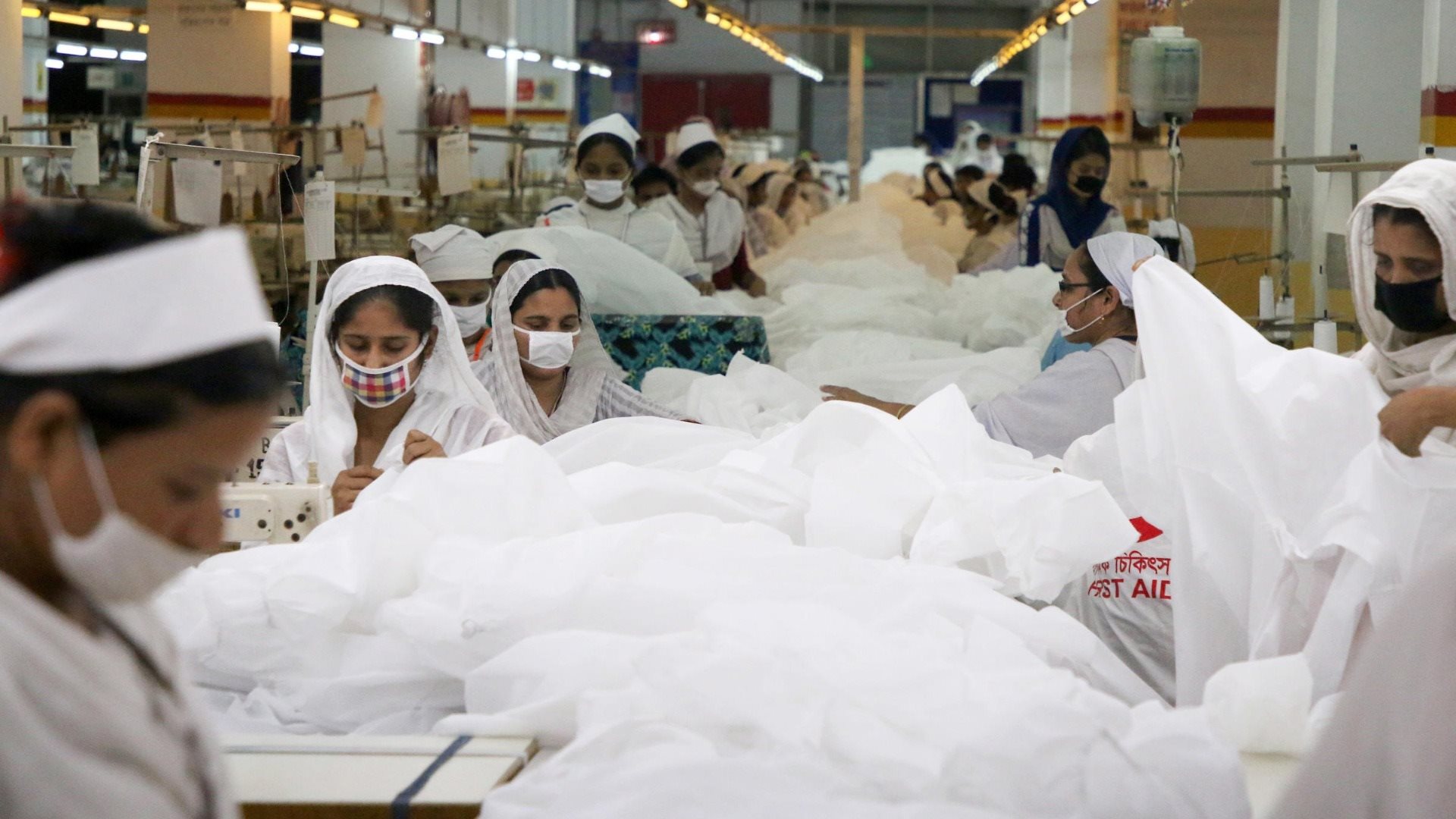COVID-19: the Local Government Finance response in Bangladesh

Caption: Workers in Dhaka sew protective suits at a garment factory during Bangladesh's lockdown. © Sultan Mahmud Mukut / Sopa Images/lightrocket via Getty Image
Bangladesh protects the local economy
Half a million expatriate Bangladeshi workers have returned to Bangladesh from 15 major remittance-sending countries, where they were employed, since the outbreak of COVID19. The country has now halted all inbound and outbound international flights to and from those counties where a majority of Bangladeshi workers live and work.
The government started home and institutional quarantine for 14 days for returnees. Since mid-March, Bangladesh has started tracking returnees by their local passport addresses and a team of local administration health workers, and law enforcement personnel have been visiting their houses to monitor their quarantine. Some places have been locked down after detection of potential infections.
Despite such direct monitoring, many returnees could not be traced due to their changes of addresses, which has been a concern for local governments.
The immediate impacts for local governments are twofold: Many of the workers will lose their jobs and the remittance flow will go down affecting the local economy, which is largely dependent on remittances sent by its expatriate workers, a large source of local purchasing power into local value chains (both urban and rural) and the country’s second-largest source of earning in foreign currency after the readymade garments.
A local daily newspaper already reported a 12% decline in remittance inflows in March compared to the same period last year, and this figure is likely to be more significant now.
Bangladesh’s Readymade Garment sector during COVID-19
According to the Daily Financial Express, the Readymade Garment (RMG) sector of Bangladesh, the largest foreign currency earner, has experienced cancellation of orders worth US$3 billion until April 3.
Unfortunately, the cancellation or slashing of orders does not only stop with an immediate impact on the profitability and earnings of the local manufacturers. Still, it could also give rise to devastating local economic consequences.
Cancellation of current orders means a loss of resources with an imminent threat to the supplier industries through “backward linkages”. These orders, which were placed by the international clothing retailers and buyers some 3-6 months back, are already produced and made ready for shipment by the local manufactures. Manufacturers have already incurred costs and remain indebted to these suppliers from whom they have already sourced the raw materials. This will trigger an alarming situation in the garment sector and its suppliers.
Over four million people are employed in this sector, and this will cause severe economic disruption, particularly when it leads to job losses. In the past, this has led to labour unrest which has had economic and social consequences.
There is a threat to the existence of small and medium-sized companies in this industry. If the economic aftermath of the virus is not mitigated then, with insufficient volumes of orders, it is highly likely that many small and medium-sized firms will be forced to shut down.
Measures taken by the central and local governments
Bangladesh has created a BDT 5000 crore fund (approximately US$589 million) for lending to all export-based industries and RMG owners to pay salaries to workers for three months.
It is an interest-free loan with a 2% service charge, and it can only be borrowed for paying staff salaries and can be repaid in two years in easy monthly instalments.
Mitigating social impact
All the factories producing knitwear have been shut. However, the majority of clothing factories have remained open.
This strategy both has advantages and disadvantages. If factories remain open, a large number of women workers will work in an environment of social distancing with factory owners providing hand sanitizers and masks. A good number of factories are also producing Personal Protective Equipment (PPE) to deal with COVID-19.
However, since a large number of women work under the same roof, if one or some of them gets infected, the risk of mass infection in factory becomes high. Many women workers live in unhygienic conditions, therefore, increasing potentials of community transmission.
Moreover, if the factories are shut down, all women workers will go back home being deprived of their salaries and may become a victim of community transmission back home.
In this situation, intergovernmental fiscal transfers are a quick and effective way to deliver local government support for garment workers. For example, UNCDF provided technical support to modify the formula based fiscal transfer system to include a COVID19 protocol—certified by the relevant authorities.
With resources from Sweden and the European Union, UNCDF is testing this out with the government by channelling US$169,000 through the fiscal transfer system to 72 local governments in Bangladesh as an Emergency Operational Expenditure Block Grant. This is used to purchase sanitizing materials, masks and gloves as well as printing publicity materials on COVID-19 and social distancing. It provides a direct means to complement the guarantee scheme for garment workers operated by the central government. Together this is a local government finance model that can be rapidly expanded nationally to mitigate the impact of COVID19 on the health and social fabric of Bangladesh.